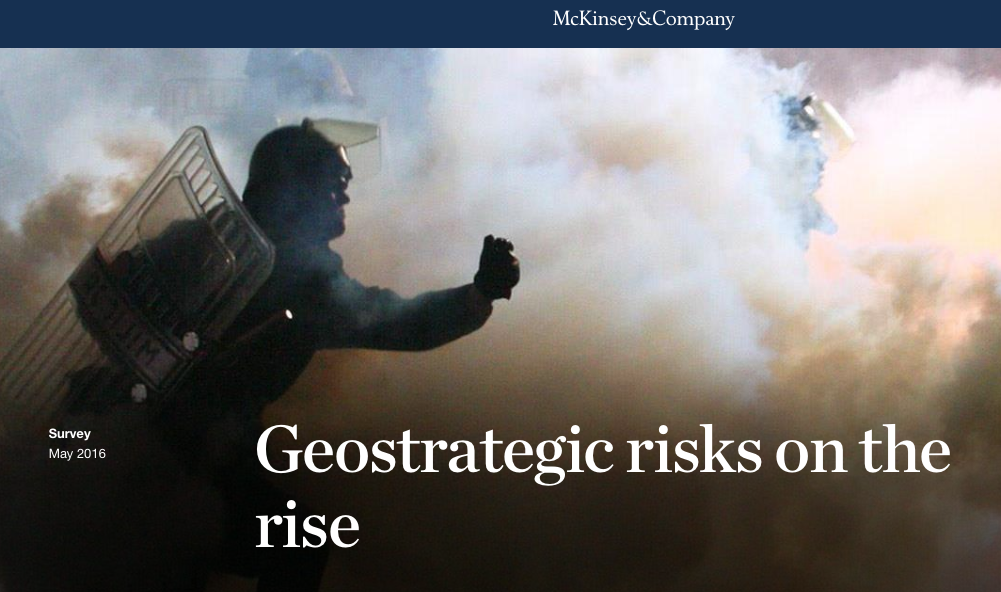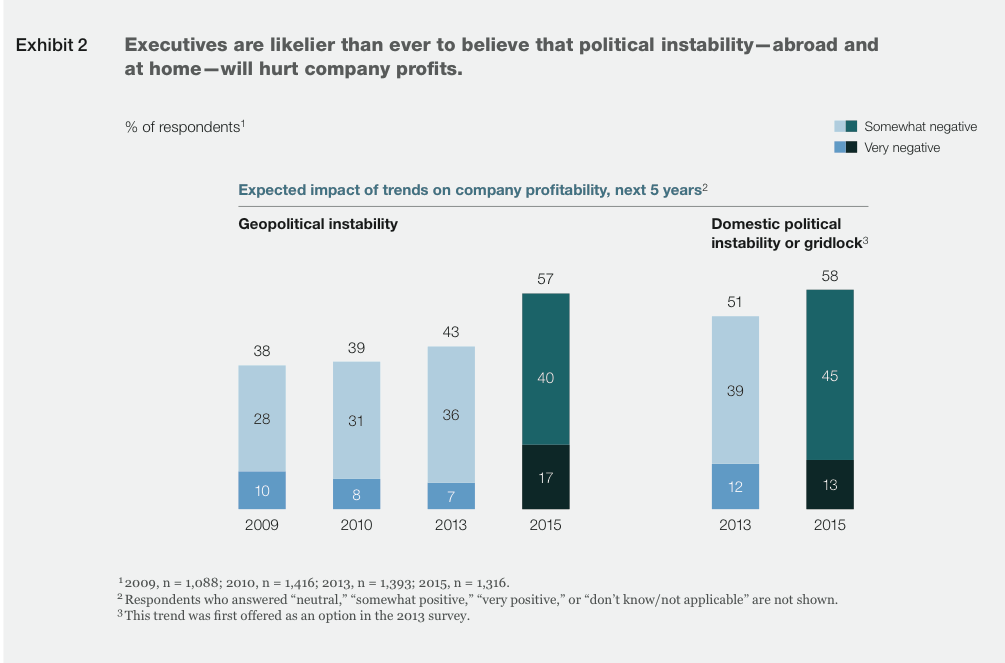
6 Jun, 2016
McKinsey report reflects state of denial in travel & tourism
A Mckinsey survey of global corporate chief executives shows that they increasingly see geostrategic instability as a very important business trend impacting on their profitability but do not quite understand what to do about it.
The survey by the reputed consultancy company says that the share of executives identifying geopolitical and domestic instability as a very important business trend has doubled in two years — the largest increase for a given trend since the consultancy began surveying executives on this topic a decade ago.
The respondents also think the situation is set to get worse. “Over the next five years, nearly all respondents expect a disruption in the global economy due to volatility. And they are much likelier now—43 percent, up from 29 percent in 2013—to expect that potential disruptions to the economy will be very severe.”

The conclusion accurately reflects the prevailing state of denial in the global travel & tourism sector which, in spite of being heavily impacted by geopolitical conflict, violence, visa restrictions, sanctions, travel advisories and higher security costs, continues to either sweep geopolitical issues under the carpet or focus on treating the symptoms and not the cause. (See editorial commentary below).
McKinsey says the online survey was in the field from November 3 to November 13, 2015, and garnered responses from 1,316 respondents representing the full range of regions, industries, company sizes, functional specialties, and tenures.
Says the report, “Most respondents expect that geopolitical, political, and macroeconomic instability — which, taken together, we call geostrategic risks — will affect their companies, with decidedly negative implications for profits….”
It adds, “Compared with 2013, a greater share now say it is very or extremely important for their organizations to understand these risks. Furthermore, nearly two-thirds of executives say their organizations view geopolitical and political risks as more or much more important than they did five years ago.
“Yet less than one-third of executives say an understanding of these factors is extremely or very well integrated into overall strategy—and only 13 percent say their companies have taken active steps to address the risks from either geopolitical or domestic political instability.”
The trend has continued to gain traction in the latest McKinsey survey which indicates a growing view that the situation is going to get worse.

Says the survey report, “This year’s results suggest an even more fundamental shift in the way executives and their companies view globalization. Over the next five years, nearly all respondents expect a disruption in the global economy due to volatility. And they are much likelier now—43 percent, up from 29 percent in 2013—to expect that potential disruptions to the economy will be very severe. This is a greater share even than those who expected very severe disruptions in 2010, in the wake of the global financial crisis.”
It adds, “Equally striking is the impact that executives anticipate from rising geopolitical instability, one of two trends that respondents most often believe will have an effect on global business in the next five years. Eighty-four percent of executives (and the largest share in the survey’s history) now believe geopolitical instability will have an important or very important impact on global business, up from 61 percent previously.
“Forty-nine percent cite this trend as very important, more than doubling the share (23 percent) who said the same two years ago.”
The survey reports, “Indeed, geopolitical instability is now just as important as trends that have ranked highest in previous surveys, such as the growth of consumers in emerging economies (cited most often as an important trend in the past five surveys) and consumer-empowering technologies. Domestic instability, too, is increasingly top of mind: two-thirds cite domestic political instability or gridlock (up from 57 percent previously) as an important or very important trend.”
Download the full survey FREE here.
EDITORIAL COMMENTARY – WHEN WILL TRAVEL & TOURISM EMERGE FROM ITS STATE OF DENIAL?
Even the most cursory survey of conference programmes at travel industry events will reflect an overwhelming predominance of three factors impacting on travel & tourism: 1) Technology; 2) Economic conditions; and 3) Climate change.
When geopolitical issues are on the radar screen, it is within the parochial context of treating the symptoms rather than the cause. Upgrading security or crisis management are seen as the “solution”, temporary and superficial though they may be.
This blind-spot is easy to explain. Geopolitical issues are often sensitive. In-depth discussions can be potentially controversial and upset sponsors. An industry that sells dreams for a living has great difficulty dealing with nightmares. Better to just skip the issue and stick to the usual comfort zones.
That is like going to a doctor for a medical check-up and then asking him to report what you want to hear, rather than what you need to hear.
Treating the symptoms and not the cause is a recipe for disaster, especially when it is clear that travel & tourism has borne the brunt of geopolitical tensions, and paid both the price and the cost of being embroiled in them.
When patients tire of their doctors, they invariably seek a second opinion. Such a move is long overdue.
If the first step towards addressing a problem is to recognise that there is one, the travel & tourism sector has little choice except to start taking a more holistic, comprehensive look at geopolitical tensions and their ripple-effect impact on industry jobs and livelihoods.
The key point of the McKinsey survey was not so much the fear that geopolitical issues can threaten bottom-lines but rather that most executives don’t understand how to deal with the threat.
That’s not surprising. How can anyone understand a potential threat if they won’t even discuss and debate it?
Over the years, Travel Impact Newswire has been the only travel & tourism publication to sound early warnings about the looming threat of multiplying geopolitical crises. Today, with every passing day, the chickens are coming home to roost. Read more:
Rising Geopolitical Threats Affecting CEOs’ Global Growth Confidence – PWC Survey released at World Economic Forum
It’s the geopolitics, stupid: Australia threatens Indonesia with travel boycott
It’s the geopolitics, stupid: ETC reports analyse impact of Ukraine standoff on Russian travel
UNWTO flags economic inequality, geopolitical tensions, conflicts as top global challenges
Geopolitical instability tops the list of risks to growth: McKinsey Global Survey results
Emerging Economies Moving from ‘Takers’ to ‘Shapers and Makers’ in New Geopolitical Landscape: WTO Chief
Economic Slump, Geopolitical Change Affecting Workers Worldwide, Survey Shows
Japanese Carmakers in China Feel the Pinch of Geopolitical Island Dispute
World Economic Forum: Most Global Experts Fear Looming Geopolitical Disruption
Palestine Now at the Core of Global Geopolitics: Travel & Tourism Should Pay Close Heed
ITB 2011 Curtain-Raiser 2: The Global Geopolitical Revolution



Liked this article? Share it!